Luminous Read online
Page 10
We had thirty seconds to decide, or we’d be doing neither today. And maybe Yuen had the resources to keep the map safe from IA while we waited a month or more for another session on Luminous, but I wasn’t prepared to live with that kind of uncertainty.
‘I say we get rid of the whole thing. Anything less is too dangerous. Future mathematicians will still be able to study the map – and if no one believes that the defect itself ever really existed, that’s just too bad. IA are too close. We can’t risk it.’
Alison had one hand poised above the keyboard. I turned to Yuen; he was staring at the floor with an anguished expression. He’d let us state our views, but in the end it was his decision.
He looked up, and spoke sadly but decisively.
‘OK. Do it.’
Alison hit the key, with about three seconds to spare. I sagged into my chair, light-headed with relief.
* * *
We watched the far side shrinking. The process didn’t look quite as crass as bulldozing an island – more like dissolving some quirkily beautiful crystal in acid. Now that the danger was receding before our eyes, though, I was beginning to suffer faint pangs of regret. Our mathematics had coexisted with this strange anomaly for fifteen billion years, and it shamed me to think that, within months of its discovery, we’d backed ourselves into a corner where we’d had no choice but to destroy it.
Yuen seemed transfixed by the process. ‘So are we breaking the laws of physics – or enforcing them?’
Alison said, ‘Neither. We’re merely changing what the laws imply.’
He laughed softly. ‘ ‘‘Merely’’. For some esoteric set of complex systems, we’re rewriting the high-level rules of their behaviour. Not including the human brain, I hope.’
My skin crawled. ‘Don’t you think that’s … unlikely?’
‘I was joking.’ He hesitated, then added soberly, ‘Unlikely for humans, but someone could be relying on this, somewhere. We might be destroying the whole basis of their existence: certainties as fundamental to them as a child’s multiplication tables are to us.’
Alison could barely conceal her scorn. ‘This is junk mathematics – a relic of a pointless accident. Any kind of life which evolved from simple to complex forms would have no use for it. Our mathematics works for … rocks, seeds, animals in the herd, members of the tribe. This only kicks in beyond the number of particles in the universe—’
‘Or smaller systems which represent those numbers,’ I reminded her.
‘And you think life somewhere might have a burning need to do non-standard trans-astronomical arithmetic, in order to survive? I doubt that very much.’
We fell silent. Guilt and relief could fight it out later, but no one suggested halting the program. In the end, maybe nothing could outweigh the havoc the defect would have caused if it had ever been harnessed as a weapon, and I was looking forward to composing a long message to Industrial Algebra, informing them of precisely what we’d done to the object of their ambitions.
Alison pointed to a corner of the screen. ‘What’s that?’ A narrow dark spike protruded from the shrinking cluster of statements. For a moment I thought it was merely avoiding the near side’s assault, but it wasn’t. It was slowly, steadily, growing longer.
‘Could be a bug in the mapping algorithm.’ I reached for the keyboard and zoomed in on the structure. In close-up, it was several thousand statements wide. At its border, Alison’s program could be seen in action, testing statements in an order designed to force tendrils of the near side ever deeper into the interior. This slender extrusion, ringed by contradictory mathematics, should have been corroded out of existence in a fraction of a second. Something was actively countering the assault, though – repairing every trace of damage before it could spread.
‘If IA have a bug here—’ I turned to Yuen. ‘They couldn’t take on Luminous directly, so they couldn’t stop the whole far side shrinking, but a tiny structure like this … What do you think? Could they stabilise it?’
‘Perhaps,’ he conceded. ‘Four or five hundred top-speed work stations could do it.’
Alison was typing frantically on her notepad. She said, ‘I’m writing a patch to identify any systematic interference and divert all our resources against it.’ She brushed her hair out of her eyes. ‘Look over my shoulder, will you, Bruno? Check me as I go.’
‘OK.’ I read through what she’d written so far. ‘You’re doing fine. Stay calm.’ Her hands were trembling.
The spike continued to grow steadily. By the time the patch was ready, the map was re-scaling constantly to fit it on the screen.
Alison triggered the patch. An overlay of electric blue appeared along the spike, flagging the concentration of computing power, and the spike abruptly froze.
I held my breath, waiting for IA to notice what we’d done – and switch their resources elsewhere? If they did, no second spike would appear – they’d never get that far – but the blue marker on the screen would shift to the site where they’d regrouped and tried to make it happen.
But the blue glow didn’t move from the existing spike. And the spike didn’t vanish under the weight of Luminous’s undivided efforts.
Instead, it began to grow again, slowly.
Yuen looked ill. ‘This is not Industrial Algebra. There’s no computer on the planet—’
Alison laughed derisively. ‘What are you saying now? Aliens who need the far side are defending it? Aliens where? Nothing we’ve done has had time to reach even … Jupiter.’ There was an edge of hysteria in her voice.
‘Have you measured how fast the changes propagate? Do you know, for certain, that they can’t travel faster than light – with the far-side mathematics undermining the logic of relativity?’
I said, ‘Whoever it is, they’re not defending all their borders. They’re putting everything they’ve got into the spike.’
‘They’re aiming at something. A specific target.’ Yuen reached over Alison’s shoulder for the keyboard. ‘We’re shutting this down. Right now.’
She turned on him, blocking his way. ‘Are you crazy? We’re almost holding them off! I’ll rewrite the program, fine-tune it, get an edge in efficiency—’
‘No! We stop threatening them, then see how they react. We don’t know what harm we’re doing—’
He reached for the keyboard again.
Alison jabbed him in the throat with her elbow, hard. He staggered backwards, gasping for breath, then crashed to the floor, bringing a chair down on top of him. She hissed at me, ‘Quick – shut him up!’
I hesitated, loyalties fracturing; his idea had sounded perfectly sane to me. But if he started yelling for security …
I crouched down over him, pushed the chair aside, then clasped my hand over his mouth, forcing his head back with pressure on the lower jaw. We’d have to tie him up and then try brazenly marching out of the building without him. But he’d be found in a matter of minutes. Even if we made it past the gate, we were screwed.
Yuen caught his breath and started struggling; I clumsily pinned his arms with my knees. I could hear Alison typing, a ragged staccato; I tried to get a glimpse of the work-station screen, but I couldn’t turn that far without taking my weight off Yuen.
I said, ‘Maybe he’s right: maybe we should pull back and see what happens.’ If the alterations could propagate faster than light … how many distant civilisations might have felt the effects of what we’d done? Our first contact with extraterrestrial life could turn out to be an attempt to obliterate mathematics which they viewed as … what? A precious resource? A sacred relic? An essential component of their entire world view?
The sound of typing stopped abruptly. ‘Bruno? Do you feel—’
‘What? ’
Silence.
‘What?’
Yuen seemed to have given up the fight. I risked turning around.
Alison was hunched forward, her face in her hands. On the screen, the spike had ceased its relentless linear growth, but now an elab
orate dendritic structure had blossomed at its tip. I glanced down at Yuen; he seemed dazed, oblivious to my presence. I took my hand from his mouth, warily. He lay there placidly, smiling faintly, eyes scanning something I couldn’t see.
I climbed to my feet. I took Alison by the shoulders and shook her gently; her only response was to press her face harder into her hands. The spike’s strange flower was still growing, but it wasn’t spreading out into new territory; it was sending narrow shoots back in on itself, criss-crossing the same region again and again with ever finer structures.
Weaving a net? Searching for something?
It hit me with a jolt of clarity more intense than anything I’d felt since childhood. It was like reliving the moment when the whole concept of numbers had finally snapped into place – but with an adult’s understanding of everything it opened up, everything it implied. It was a lightning-bolt revelation – but there was no taint of mystical confusion: no opiate haze of euphoria, no pseudo-sexual rush. In the clean-lined logic of the simplest concepts, I saw and understood exactly how the world worked—
—Except that it was all wrong, it was all false, it was all impossible.
Quicksand.
Assailed by vertigo, I swept my gaze around the room, counting frantically: Six work stations. Two people. Six chairs. I grouped the work stations: three sets of two, two sets of three. One and five, two and four; four and two, five and one.
I weaved a dozen cross-checks for consistency – for sanity … but everything added up.
They hadn’t stolen the old arithmetic; they’d merely blasted the new one into my head, on top of it.
Whoever had resisted our assault with Luminous had reached down with the spike and rewritten our neural metamathematics – the arithmetic which underlay our own reasoning about arithmetic – enough to let us glimpse what we’d been trying to destroy.
Alison was still uncommunicative, but she was breathing slowly and steadily. Yuen seemed fine, lost in a happy reverie. I relaxed slightly, and began trying to make sense of the flood of far-side arithmetic surging through my brain.
On their own terms, the axioms were … trivial, obvious. I could see that they corresponded to elaborate statements about trans-astronomical integers, but performing an exact translation was far beyond me; and thinking about the entities they described in terms of the huge integers they represented was a bit like thinking about pi or the square root of two in terms of the first ten thousand digits of their decimal expansion: it would be missing the point entirely. These alien ‘numbers’ – the basic objects of the alternative arithmetic – had found a way to embed themselves in the integers, and to relate to each other in a simple, elegant way, and if the messy corollaries they implied upon translation contradicted the rules integers were supposed to obey … well, only a small, remote patch of obscure truths had been subverted.
Someone touched me on the shoulder. I started, but Yuen was beaming amiably, all arguments and violence forgotten.
He said, ‘Lightspeed is not violated. All the logic which requires that remains intact.’ I could only take him at his word; the result would have taken me hours to prove. Maybe the aliens had done a better job on him, or maybe he was just a superior mathematician in either system.
‘Then … where are they?’ At lightspeed, our attack on the far side could not have been felt any further away than Mars, and the strategy used to block the corrosion of the spike would have been impossible with even a few seconds’ time lag.
‘The atmosphere?’
‘You mean Earth’s?’
‘Where else? Or maybe the oceans.’
I sat down heavily. Maybe it was no stranger than any conceivable alternative, but I still baulked at the implications.
Yuen said, ‘To us, their structure wouldn’t look like ‘‘structure’’ at all. The simplest unit might involve a group of thousands of atoms – representing a trans-astronomical number – not necessarily even bonded together in any conventional way, but breaking the normal consequences of the laws of physics, obeying a different set of high-level rules which arise from the alternative mathematics. People have often mused about the chances of intelligence being coded into long-lived vortices on distant gas giants … but these creatures won’t be in hurricanes or tornadoes. They’ll be drifting in the most innocuous puffs of air, invisible as neutrinos.’
‘Unstable—’
‘Only according to our mathematics. Which does not apply.’
Alison broke in suddenly, angrily. ‘Even if all of this is true, where does it get us? Whether the defect supports a whole invisible ecosystem or not, IA will still find it, and use it, in exactly the same way.’
For a moment I was dumbstruck. We were facing the prospect of sharing the planet with an undiscovered civilisation and all she could think about was IA’s grubby machinations?
She was absolutely right, though. Long before any of these extravagant fantasies could be proved or disproved, IA could still do untold harm.
I said, ‘Leave the mapping software running, but shut down the shrinker.’
She glanced at the screen. ‘No need. They’ve overpowered it, or undermined its mathematics.’ The far side was back to its original size.
‘Then there’s nothing to lose. Shut it down.’
She did. No longer under attack, the spike began to reverse its growth. I felt a pang of loss as my limited grasp of the far-side mathematics suddenly evaporated; I tried to hold on, but it was like clutching at air.
When the spike had retracted completely, I said, ‘Now we try doing an Industrial Algebra. We try bringing the defect closer.’
We were almost out of time, but the task was easy enough. In thirty seconds, we rewrote the shrinking algorithm to function in reverse.
Alison programmed a function key with the commands to revert to the original version, so that if the experiment backfired, one keystroke would throw the full weight of Luminous behind a defence of the near side again.
Yuen and I exchanged nervous glances. I said, ‘Maybe this wasn’t such a good idea.’
Alison disagreed. ‘We need to know how they’ll react to this. Better we find out now than leave it to IA.
’She started the program running.
The sea-urchin began to swell, slowly. I broke out in a sweat. The far-siders hadn’t harmed us, so far, but this felt like tugging hard at a door which you really, badly, didn’t want to see thrown open.
A technician poked her head into the room and announced cheerfully, ‘Down for maintenance in two minutes!’
Yuen said, ‘I’m sorry, there’s nothing—’
The whole far side turned electric blue. Alison’s original patch had detected a systematic intervention.
We zoomed in. Luminous was picking off vulnerable statements of the near side, but something else was repairing the damage.
I let out a strangled noise that might have been a cheer.
Alison smiled serenely. She said, ‘I’m satisfied. IA don’t stand a chance.’
Yuen mused, ‘Maybe they have a reason to defend the status quo. Maybe they rely on the border itself, as much as the far side.’
Alison shut down our reversed shrinker. The blue glow vanished; both sides were leaving the defect alone. There were a thousand questions we all wanted answered, but the technicians had thrown the master switch, and Luminous itself had ceased to exist.
* * *
The sun was breaking through the skyline as we rode back into the city. As we pulled up outside the hotel, Alison started shaking and sobbing. I sat beside her, squeezing her hand. I knew she’d felt the weight of what might have happened, all along, far more than I had.
I paid the driver, and then we stood on the street for a while, silently watching the cyclists go by, trying to imagine how the world would change as it endeavoured to embrace this new contradiction between the exotic and the mundane, the pragmatic and the Platonic, the visible and the invisible.
MISTER VOLITION
; ‘Give me the patch.’
He hesitates, despite the gun, long enough to confirm that the thing must be genuine. He’s cheaply dressed but expensively groomed: manicured and depilated, with the baby-smooth skin of rich middle age. Any card in his wallet would be p-cash only, anonymous but encrypted, useless without his own living finger-prints. He’s wearing no jewellery, and his watchphone is plastic; the patch is the only thing worth taking. Good fakes cost 15 cents, good real ones 15 K, but he’s the wrong age, and the wrong class, to want to wear a fake for the sake of fashion.
He tugs at the patch gently, and it dislodges itself from his skin; the adhesive rim doesn’t leave the faintest weal or pluck a single hair from his eyebrow. His newly naked eye doesn’t blink or squint, but I know it’s not truly sighted yet; the suppressed perceptual pathways take hours to reawaken.
He hands me the patch; I half expect it to stick to my palm, but it doesn’t. The outer face is black, like anodised metal, with a silver-grey logo of a dragon in one corner – drawn ‘escaping’ from a cut-and-folded drawing of itself, to bite its own tail. Recursive Visions, after Escher. I press the gun harder against his stomach to remind him of its presence, while I glance down and turn the thing over. The inner face appears velvet black at first, but as I tilt it I catch the reflection of a street light, rainbow-diffracted by the array of quantum-dot lasers. Some plastic fakes are moulded with pits which give a similar effect, but the sharpness of this image – dissected into colours, but not blurred at all – is like nothing I’ve ever seen before.
I look up at him, and he meets my gaze warily. I know what he’s feeling – that icewater in the bowels – but there’s something more than fear in his eyes: a kind of dazed curiosity, as if he’s drinking in the strangeness of it all. Standing here at three in the morning with a gun to his intestines. Robbed of his most expensive toy. Wondering what else he’s going to lose.

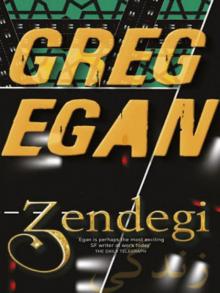 Zendegi
Zendegi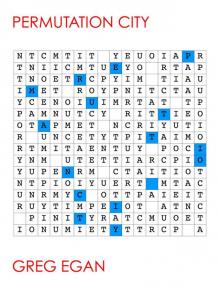 Permutation City
Permutation City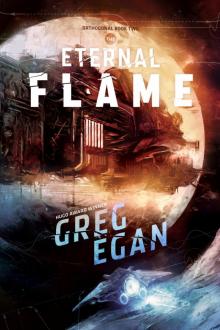 The Eternal Flame
The Eternal Flame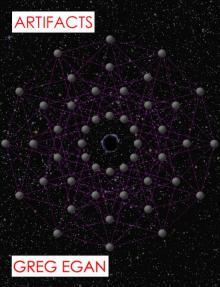 Artifacts
Artifacts Wang's Carpets
Wang's Carpets Dichronauts
Dichronauts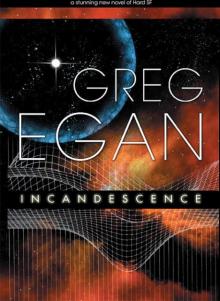 Incandescence
Incandescence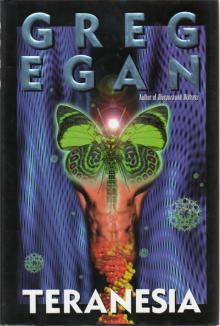 Teranesia
Teranesia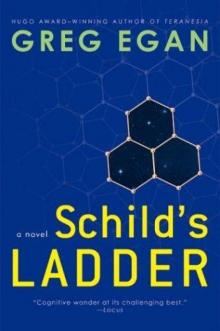 Schild's Ladder
Schild's Ladder Quarantine
Quarantine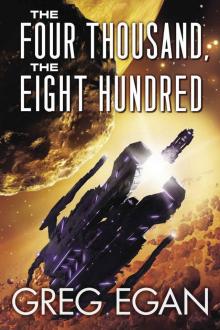 The Four Thousand, the Eight Hundred
The Four Thousand, the Eight Hundred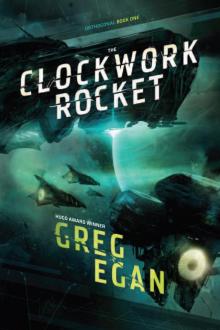 The Clockwork Rocket
The Clockwork Rocket Zeitgeber
Zeitgeber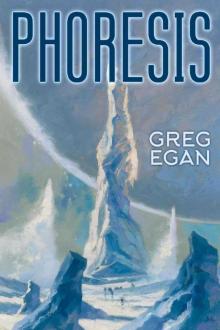 Phoresis
Phoresis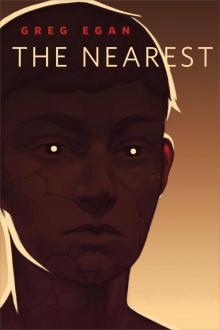 The Nearest
The Nearest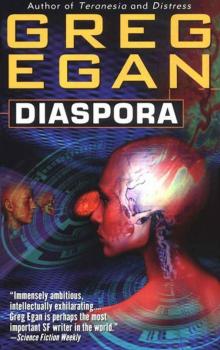 Diaspora
Diaspora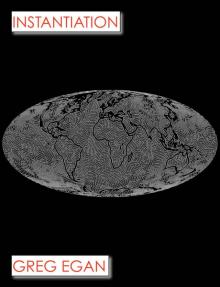 Instantiation
Instantiation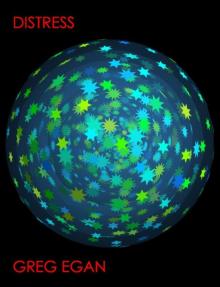 Distress
Distress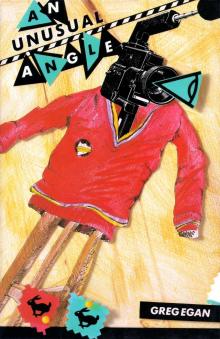 An Unusual Angle
An Unusual Angle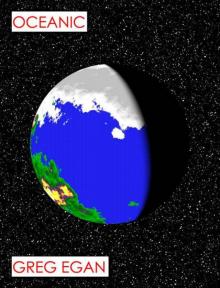 Oceanic
Oceanic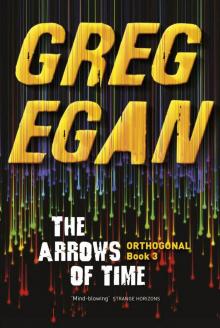 The Arrows of Time
The Arrows of Time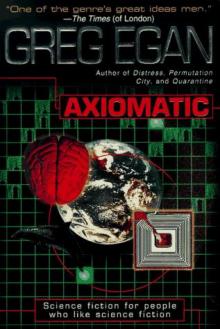 Axiomatic
Axiomatic![Anthology 2. Luminous [1998, 2010] Read online](http://i1.bookreadfree.com/i/03/18/anthology_2_luminous_1998_2010_preview.jpg) Anthology 2. Luminous [1998, 2010]
Anthology 2. Luminous [1998, 2010]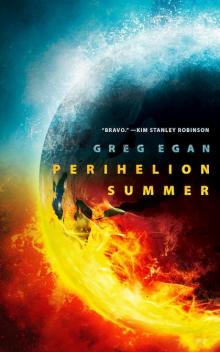 Perihelion Summer
Perihelion Summer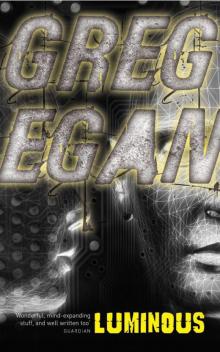 Luminous
Luminous